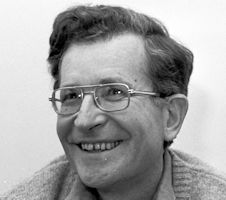
 |
Professor Noam ChomskyMIT, Department of Linguistics and PhilosophyNeedless to say, I am extremely pleased and honored to receive this award from the outstanding center of computer science at York. |
My own interests in the mysteries of language date back to childhood. I was fortunate to begin my formal education in the period when computer science was just developing, building on the achievements of great mathematicians of the interwar period -- Gödel, Turing, Post, Church and others -- who created the mathematical theory of computation. It was clear at once that their work provided the intellectual tools to address a crucial problem posed by Galileo and his contemporaries, who were amazed by the fact that with a few symbols, we are able to construct infinitely many thoughts and to convey to others the inner workings of our minds. The effort to address this challenge had long been abandoned, and in fact forgotten, but by mid-20th century it was clear how to take it up by constructing computational systems that captures the basic property of language: generation of an unbounded array of hierarchically structured expressions, each of which is the linguistic articulation of a thought and can be externalized to some physical output. That initiated the “generative enterprise.”
What then are these systems? One productive approach was to adopt Post’s system of rewriting rules, universal if unrestricted, but reflecting critical properties of language as constraints are added. A parallel inquiry sought to determine the universal properties of language that would have to be captured by generative systems. One striking result, after many years, is that the simplest computational operation, binary set-formation, suffices to account for deep and surprising general properties of language, even more if supplemented by principles of computational efficiency of much broader scope. This opens the way to exciting inquiries of a kind never before contemplated seriously.
